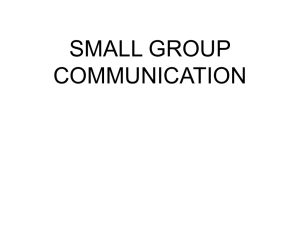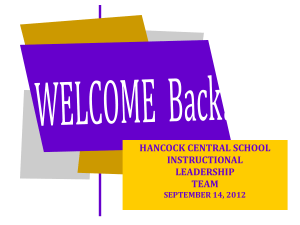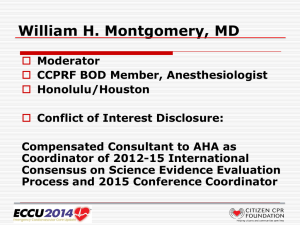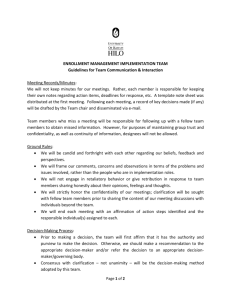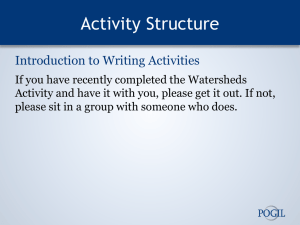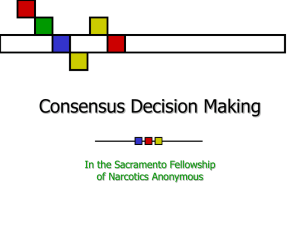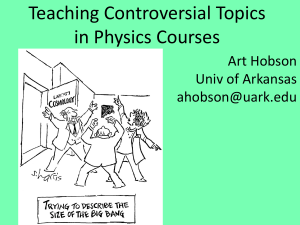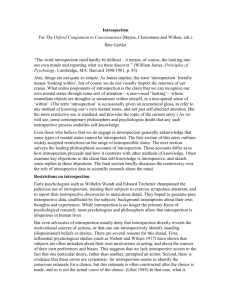Does language - meat of the essay
advertisement
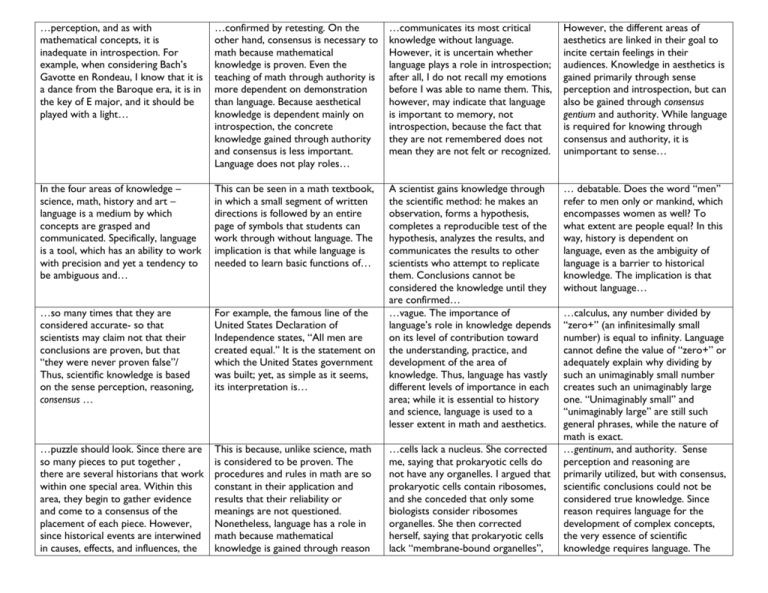
…perception, and as with mathematical concepts, it is inadequate in introspection. For example, when considering Bach’s Gavotte en Rondeau, I know that it is a dance from the Baroque era, it is in the key of E major, and it should be played with a light… …confirmed by retesting. On the other hand, consensus is necessary to math because mathematical knowledge is proven. Even the teaching of math through authority is more dependent on demonstration than language. Because aesthetical knowledge is dependent mainly on introspection, the concrete knowledge gained through authority and consensus is less important. Language does not play roles… …communicates its most critical knowledge without language. However, it is uncertain whether language plays a role in introspection; after all, I do not recall my emotions before I was able to name them. This, however, may indicate that language is important to memory, not introspection, because the fact that they are not remembered does not mean they are not felt or recognized. However, the different areas of aesthetics are linked in their goal to incite certain feelings in their audiences. Knowledge in aesthetics is gained primarily through sense perception and introspection, but can also be gained through consensus gentium and authority. While language is required for knowing through consensus and authority, it is unimportant to sense… In the four areas of knowledge – science, math, history and art – language is a medium by which concepts are grasped and communicated. Specifically, language is a tool, which has an ability to work with precision and yet a tendency to be ambiguous and… This can be seen in a math textbook, in which a small segment of written directions is followed by an entire page of symbols that students can work through without language. The implication is that while language is needed to learn basic functions of… … debatable. Does the word “men” refer to men only or mankind, which encompasses women as well? To what extent are people equal? In this way, history is dependent on language, even as the ambiguity of language is a barrier to historical knowledge. The implication is that without language… …so many times that they are considered accurate- so that scientists may claim not that their conclusions are proven, but that “they were never proven false”/ Thus, scientific knowledge is based on the sense perception, reasoning, consensus … For example, the famous line of the United States Declaration of Independence states, “All men are created equal.” It is the statement on which the United States government was built; yet, as simple as it seems, its interpretation is… A scientist gains knowledge through the scientific method: he makes an observation, forms a hypothesis, completes a reproducible test of the hypothesis, analyzes the results, and communicates the results to other scientists who attempt to replicate them. Conclusions cannot be considered the knowledge until they are confirmed… …vague. The importance of language’s role in knowledge depends on its level of contribution toward the understanding, practice, and development of the area of knowledge. Thus, language has vastly different levels of importance in each area; while it is essential to history and science, language is used to a lesser extent in math and aesthetics. …puzzle should look. Since there are so many pieces to put together , there are several historians that work within one special area. Within this area, they begin to gather evidence and come to a consensus of the placement of each piece. However, since historical events are interwined in causes, effects, and influences, the This is because, unlike science, math is considered to be proven. The procedures and rules in math are so constant in their application and results that their reliability or meanings are not questioned. Nonetheless, language has a role in math because mathematical knowledge is gained through reason …cells lack a nucleus. She corrected me, saying that prokaryotic cells do not have any organelles. I argued that prokaryotic cells contain ribosomes, and she conceded that only some biologists consider ribosomes organelles. She then corrected herself, saying that prokaryotic cells lack “membrane-bound organelles”, …calculus, any number divided by “zero+” (an infinitesimally small number) is equal to infinity. Language cannot define the value of “zero+” or adequately explain why dividing by such an unimaginably small number creates such an unimaginably large one. “Unimaginably small” and “unimaginably large” are still such general phrases, while the nature of math is exact. …gentinum, and authority. Sense perception and reasoning are primarily utilized, but with consensus, scientific conclusions could not be considered true knowledge. Since reason requires language for the development of complex concepts, the very essence of scientific knowledge requires language. The historians from different studies act as authorities in their study by communicating their knowledge. They put their small… Many scientific terms, such as the names of organisms, are given Latin names so that they are not subject to change. Since language in science must be concise, words are not a barrier to scientific understanding, but a tool for scientific development. However, this does not lessen the importance of its role. For example, a feeler gauge is a tool used to measure… and… when one term was imprecise, it was replaced. more complex science becomes, the more necessary language becomes as a tool for understanding. Since history is intangible, historical knowledge is comprised of words which represent historical concepts. The job of a historian is comparable to the task of putting together a puzzle of an infinite number of pieces, but without ever seeing the picture of how the finished… … the gaps between spark plugs; each of its blades is set with measurement to the thousandths of an inch. It is a tool that requires precision, yet its job is uniquely important because, after all, one could not make the same measurements with a standard ruler. Such is the role of language in science; it could not effectively be replaced by cruder methods of communication. …math – once those functions are understood, language is almost obsolete because the same mathematical functions will work without language. An uncertainty is that language fails to sully describe mathematical concepts, such as with infinity and “zero+”. …knowledge of history could not exist. The uncertainty is that since language bends the perception of history, and history is comprised of language, there exists a problem of the knowledge that language actually lends to history. There is also an implication that science utilizes only language that is tailored to precision. However, the uncertainty is that there are still disagreements over the definitions scientific terms. For instance, my science teacher once asked for the difference between prokaryotic and eukaryotic cells. I answered that prokaryotic … …sections of the puzzle together to form a more comprehensive – yet inevitably unfinished – picture of the past. Therefore, in order to acquire historical knowledge, historians use reason, consensus gentium, and authority – all of which require language. Reason requires language because one must think in words when considering critical concepts and connections. Consensus gentium and authority require language as a means of communicating ideas. …authority. It must be noted that the reasoning in math is different than that of science or history. It is not formulated with words, but with values, these exist intrinsically, even without names. In fact, words are inadequate in grasping mathematical concepts – such as the concept of infinity. It goes beyond what can be explained, and when it is used mathematically, its name is insignificant. For example, when working with limits in… However, while authority and consensus contribute to each area, they are necessary only to science and history. Since historical conclusions cannot be tested, knowledge must be verified from consensus and communicated by authority. In science, information cannot become knowledge until it is repeatedly confirmed (consensus). Authority is less crucial because most scientific knowledge can be… …staccato. While this demonstrates a very concrete knowledge of music, art goes beyond what is concrete: what I cannot explain is why I love the piece or what feeling of attachment I experience when I play or hear it. This is where language fails aesthetical knowledge. This implies that art… …of equal importance in every area of knowledge. It is a tool for thought and communication, but it seems that in different areas of knowledge, thought occurs differently and communication becomes less crucial. Still, the versatility of language allows it to seep into every area of knowledge regardless of its role.
